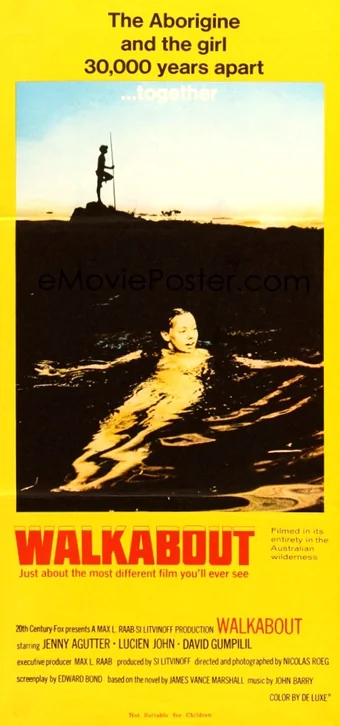🎯 Quick Overview
Trailer
- Director: Nicolas Roeg
- Genre: Adventure, Drama
- Release year: 1971
- Runtime (length): 1h 40min
- IMDb rating: 7.6/10 (28K votes)
- Rotten Tomatoes: 86%
😅 Plot Summary – Badly Explained
City kids go camping, dad has a mid-life crisis involving firearms, then an Indigenous tour guide shows them the real Australia, but cultural differences lead to tragedy and missed connections, all set to stunning visuals.
🍿 Walkabout: Detailed Plot Synopsis
Stranded in the Outback
The film opens with a British family living in Sydney, Australia. During a picnic in the Outback, the father, for seemingly inexplicable reasons, attempts to kill his children before taking his own life. This leaves his teenage daughter and young son stranded and alone in the harsh Australian wilderness, far from civilization and unprepared for survival. The children are left to their own devices with little more than the clothes they are wearing.
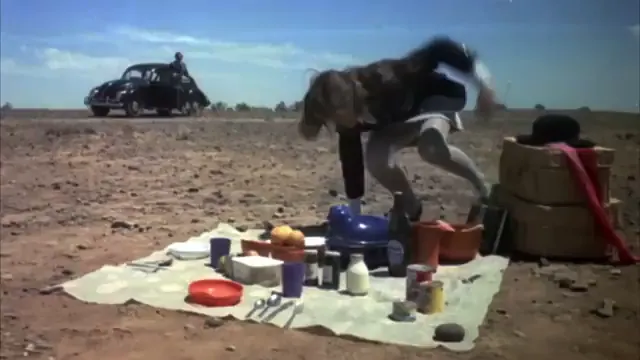
Encounter with an Aboriginal Boy
As the children wander through the Outback, they encounter an Aboriginal boy on his ‘walkabout,’ a traditional rite of passage where young men live off the land. Unable to communicate verbally due to language barriers, the boy nevertheless guides and protects them, sharing his knowledge of survival skills and the natural world. He provides them with food, water, and shelter, demonstrating a deep connection to the land.
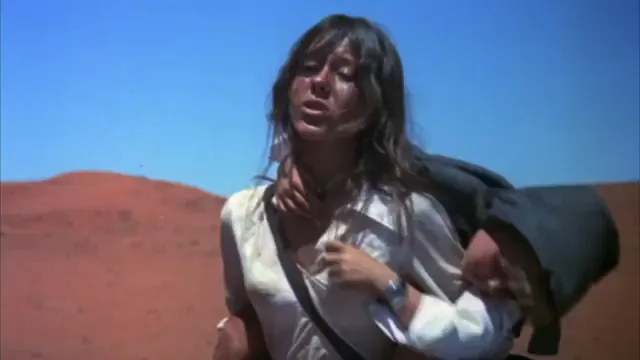
Cultural Clash and Growing Tension
Throughout their journey, the film highlights the cultural differences between the British children and the Aboriginal boy. The girl struggles to understand the boy’s customs and way of life, while her younger brother adapts more easily. As they travel, the Aboriginal boy develops feelings for the girl, creating a sense of unease and tension between them.
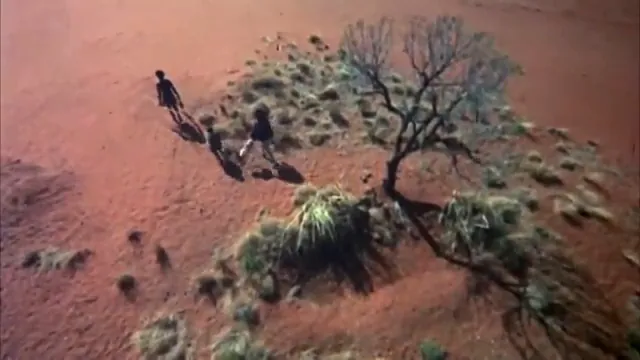
⚠️ Spoilers and Ending Explained
🎬 Cast & Characters
- Girl (Jenny Agutter): A resourceful but culturally limited teenager who struggles to adapt to the Australian Outback after a family tragedy.
- Black Boy (David Gulpilil): An Aboriginal youth on his walkabout, who uses his survival skills to help the stranded siblings, but is ultimately unable to bridge the cultural gap.
- White Boy (Luc Roeg): The younger brother who more easily adapts to the outback and communicates with the Aboriginal boy.
- Father (John Meillon): A troubled man who initiates the story’s conflict with a sudden act of violence, leaving his children stranded.
💬 Memorable Quotes
- Narrator: “Into my heart an air that kills, From yon far country blows: What are those blue remembered hills, What spires, what farms are those? That is the land of lost content, I see it shining plain, The happy highways where I went, And cannot come again.” – These are the last lines of the film, taken from A.E. Housman’s poem, reflecting the girl’s nostalgia and loss.
💰Box Office
- Budget: A$1,000,000
- Domestic Gross: N/A
- Worldwide Gross: $1,888
💥 Walkabout Reviews
Personal Review
I first watched “Walkabout” in college, and it completely blew me away. The cinematography is like nothing I’d ever seen – the outback felt so real, so vast, and so incredibly beautiful. I especially remember the swimming scene in the waterhole, it felt like I was right there with them, experiencing that freedom. The ending always gets to me; the sadness and regret really sticks with you. It’s a movie I constantly recommend.
- Who would enjoy:
- “Fans of art house films”
- “Viewers interested in Australian culture”
- “Those who enjoy films with environmental themes”
- “People who appreciate visually stunning cinematography”
- Content warnings ⚠:
- “Suicide”
- “Nudity”
- “Animal Slaughter”
- “Thematic elements may be disturbing to some viewers”
Professional Reviews
- Indiewire: “Walkabout offers a fascinating look at cultural differences and the human connection to nature, elevated by Nicolas Roeg’s stunning cinematography. The film’s visual storytelling captivates and immerses you into the beauty and harsh realities of the Australian Outback, leaving a lasting impact.
- Slash Film: “Jenny Agutter’s performance is iconic. Walkabout is a challenging yet rewarding film that will linger with you long after the credits roll. It’s a story about survival, cultural disconnect, and the human spirit. Nicolas Roeg’s Walkabout stands the test of time.
Audience Reactions
The stunning visuals of the Australian Outback are breathtaking and unforgettable.: Viewers praise the immersive experience of being transported to the heart of the Australian wilderness.
David Gulpilil’s performance is nuanced and deeply moving.: Audiences are consistently impressed by Gulpilil’s portrayal of the Aboriginal boy, highlighting his ability to convey complex emotions without extensive dialogue.
Overall Consensus: “Walkabout” is a visually stunning and thought-provoking film that explores themes of cultural disconnect and the relationship between humanity and nature. While some find its pacing slow, its impact is undeniable.
Awards
🛠️ Behind the Scenes
- “The film was shot on location in the Australian Outback, adding to its authentic and visually stunning portrayal of the landscape.”
- “The script was only 14 pages long, with much of the dialogue and action being improvised by the actors, adding to the film’s naturalistic feel.”
- “David Gulpilil, who played the Aboriginal boy, had no formal acting training prior to the film, and his performance was largely based on his own experiences and understanding of Aboriginal culture.”
🖥️ How to Watch Walkabout?
Walkabout is available for rent or purchase on various platforms, including Amazon Prime Video, Apple TV, and Google Play Movies. Check your local listings for availability on streaming services like Criterion Channel, which often features classic films. Physical copies on Blu-ray and DVD can also be found online and in stores.
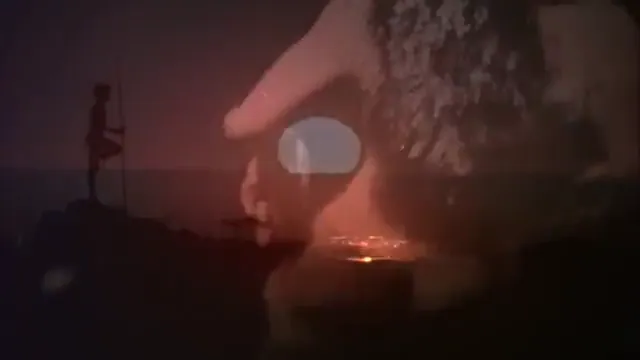
🎥 Similar Movies
If you enjoyed Walkabout, you might like these similar films:
- Picnic at Hanging Rock (1975): Explores themes of cultural clash, mystery, and the allure of the Australian landscape.
- The Last Wave (1977): Features a collision of Aboriginal culture and Western society.
- Rabbit-Proof Fence (2002): Focuses on the experiences of Aboriginal children and the impact of colonial policies.
🛒 Walkabout Related Products
- Walkabout (The Criterion Collection) [Blu-ray]: A beautifully restored edition of the film, featuring insightful commentary and documentaries about the making of the film and the cultural impact of Walkabout.
- Rabbit-Proof Fence: Rabbit-Proof Fence explores similar themes of indigenous experience in Australia.
- Australia – Movie Poster Print – 24×36: Capture the magic with a beautiful movie poster of Walkabout, perfect for any movie lover.
- David Gulpilil: My Story: Read a biography of the unforgettable actor.
🎧 Soundtrack
Walkabout features a captivating soundtrack that enhances the movie’s atmosphere and emotional impact. Here are some notable tracks:
You can find the complete soundtrack on Amazon Music and Apple Music.
🤨 FAQ
In Aboriginal Australian culture, a ‘walkabout’ is a traditional rite of passage where young men embark on a journey to live off the land and prove their self-sufficiency. It’s a time of learning and spiritual growth, marking the transition into adulthood.
Walkabout explores several themes, including the clash between nature and civilization, cultural misunderstanding, the loss of innocence, and the impact of Western society on Aboriginal culture and the environment. It also examines the human connection to the natural world.
The film does not explicitly state the father’s motivation for attempting to kill his children. The ambiguity is intentional, leaving the audience to interpret his actions. Some suggest it symbolizes a breakdown due to the pressures of modern life or a deeper psychological disturbance.
Heartbroken and rejected after his failed attempt to connect with the girl, and disillusioned by witnessing the brutality of modern civilization, the Aboriginal boy commits suicide.
🔥 Bonus Content
Walkabout’ | Critics’ Picks | The New York Times
Ever wonder what the critics thought of Walkabout? A.O. Scott from The New York Times gives a really interesting take on the film’s themes of innocence. Definitely worth checking out if you want to dive deeper!
JENNY AGUTTER: ABOUT NUDITY IN WALKABOUT
The nudity in Walkabout was pretty groundbreaking for its time, wasn’t it? Hear Jenny Agutter’s thoughts on it – she shares some insightful perspectives that you wouldn’t expect. Super interesting stuff!
Jenny Agutter and Luc Roeg talk WALKABOUT (2006)
Want to hear some behind-the-scenes stories about Walkabout? Jenny Agutter and Luc Roeg share their thoughts on the film’s making. It’s a great watch if you enjoyed the movie!
✨ Rate
There are no reviews yet. Be the first one to write one.


